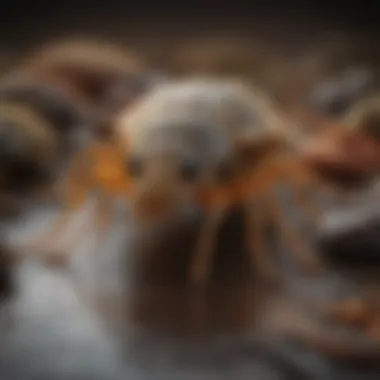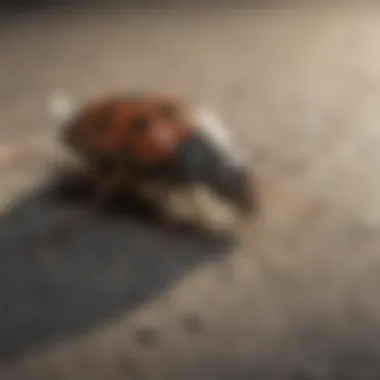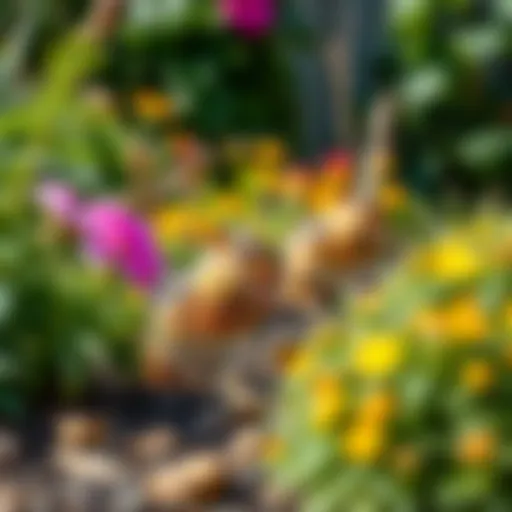Effective Pest Control Strategies in St. Petersburg


Intro
Pest control is more than simply keeping critters at bay; it's about understanding the unique ecosystem we live in, especially in a city like St. Petersburg. From rising humidity levels to diverse flora and fauna, the environment plays a crucial role in determining what pests thrive in the area. In this guide, we’ll delve into strategies that empower homeowners and gardeners to manage pests effectively, focusing not only on eradication but also on sustainable practices that benefit our ecosystem.
Understanding Pests
Pests, in essence, are organisms that can negatively impact our health, crops, or living spaces. Understanding what constitutes a pest is the first step in effective pest management.
Definition of Pests
Pests can range from insects like ants and roaches to rodents such as rats and mice. The interesting part is that not all pests are harmful; some can actually play beneficial roles in our gardens or homes. However, when their presence becomes overwhelming, it’s time to consider control measures.
Importance of Pest Identification
Identifying the specific type of pest is critical. Different pests demand different strategies; for instance, while ants can often be managed with bait traps, rodents might require more substantial interventions. Knowing what you're dealing with can save time and resources.
"An ounce of prevention is worth a pound of cure."
In pest control, this adage rings particularly true. Understanding the habits and habitats of specific pests aids in discerning the best course of action.
Prevention Techniques
Preventing pests from invading your space is generally more effective than trying to eliminate them once they're there. Here are some practical techniques for ensuring your home remains pest-free.
Home and Garden Preventative Measures
- Seal Entry Points: Small cracks and crevices can become highways for pests. Walk around your home and check for potential entry points; a little caulking goes a long way.
- Maintain Cleanliness: Pests are attracted to food sources. Storing food in airtight containers and keeping surfaces clean can significantly reduce pest attraction.
- Landscaping Choices: Consider your garden plants; certain varieties repel pests naturally. For example, marigolds can deter nematodes, while basil can keep flies at bay.
Seasonal Prevention Tips
Adapting to seasonal changes is vital in pest control. Here are some tips:
- Spring: Clear debris and check for signs of nesting insects.
- Summer: Ensure your garden is well-maintained to reduce hiding spots for pests.
- Fall: Inspect windows and doors as pests seek warmth.
- Winter: Check that all food products are sealed tightly to guard against hungry rodents.
Eco-Friendly Pest Control Solutions
As awareness of environmental issues rises, many homeowners are keen to explore sustainable pest control methods.
Overview of Sustainable Practices
Eco-friendly practices not only protect the environment but also safeguard the health of your household. Using non-toxic traps, building physical barriers, and planting pest-repelling flora are all excellent strategies. By minimizing the use of chemical pesticides, you reduce potential harm to helpful insects and the wider ecosystem.
Natural Remedies and Their Effectiveness
Natural remedies have gained popularity, and for a good reason. Common options include:
- Diatomaceous Earth: Effective against crawling insects.
- Essential Oils: Some, like peppermint, act as repellents.
- Soap and Water Solution: Can deter pests like aphids when sprayed directly.
Implementing these methods can often lead to effective pest management while being gentle on the environment.
Overview of Pest Control in St. Petersburg
Pest control is a vital aspect of maintaining homes, gardens, and public spaces in St. Petersburg. The interplay between humans and pests is a subject of significance, and understanding it can lead to healthier living environments. As an integral part of urban and suburban life, effective pest management not only enhances comfort but also safeguards property value and public health.
The Importance of Pest Control
For homeowners in St. Petersburg, the importance of pest control cannot be overstated. Beyond aesthetic concerns, pests can pose serious health risks and structural damage. From ants marching across the kitchen counter to the silent destruction of termites within walls, pests can disrupt daily life in no time. Regular pest control measures protect against infestations that can otherwise escalate quickly. Homeowners who stay vigilant often find that prevention is more effective and less costly than mitigation once an infestation takes hold. Additionally, effective pest control fosters a sense of safety and comfort—an essential component of a welcoming home atmosphere.
Local Regulations and Guidelines
Navigating the local regulations governing pest control in St. Petersburg is paramount. Laws and guidelines may vary by district, affecting how exterminators operate and what treatments are permissible. Here, the importance of connecting with local pest control services that are familiar with the regional laws cannot be understated. Homeowners should be aware of the regulations concerning pesticide application, especially in proximity to natural water sources. Following these regulations not only ensures compliance but also promotes safety for family and pets. Moreover, understanding these guidelines can empower homeowners to take an active role in pest prevention and management.


Evolving Trends in Pest Management
The field of pest management is constantly evolving, with innovative strategies emerging to tackle pest issues effectively. Among these trends, integrated pest management (IPM) stands out. It emphasizes a more holistic approach, combining biological, cultural, and chemical practices. In St. Petersburg, as homeowners become increasingly aware of the environmental impacts, eco-friendly techniques are gaining traction. These methods often focus on minimizing pesticide use while maximizing home safety and environmental health. For instance, the growing use of natural repellents and the focus on habitat modification demonstrate a shift toward sustainable pest management. Participating in this trend not only tackles the pest problem but also contributes to a healthier planet for future generations.
"Effective pest control is not just about exterminating insects; it's about creating an environment that prevents them from thriving."
As residents of St. Petersburg work to manage their pest-related challenges, being aware of the importance of pest control, adhering to local regulations, and staying informed about evolving trends is essential. By fostering this awareness, homeowners can create effective strategies tailored to their unique circumstances, ensuring long-term pest management success.
Common Pests Found in St. Petersburg
Understanding the common pests in St. Petersburg is the backbone of effective pest management. Each pest presents distinctive challenges and hazards, impacting not only home structures but also the health and comfort of those living within. Knowing what you're up against can make all the difference in maintaining a pest-free environment. Homeowners can benefit significantly from recognizing these pests - it enables timely interventions, minimizes potential damage, and increases safety. The local pest landscape is something every resident should be familiar with.
Identification of Local Insects
Ants
Ants are more than just a nuisance; their presence often indicates a deeper issue that needs addressing. These social insects can invade homes in large numbers, especially when foraging for food. A key characteristic of ants is their ability to establish colonies quickly. This adaptability makes them a common pest of concern in St. Petersburg. Ants can cause structural problems when they hollow out wood, and some species can contaminate food sources, creating health risks. Notably, fire ants are known for their painful stings, which serves as a deterrent but can also lead to allergic reactions in some individuals. If you spot a trail of ants marching to and fro in your kitchen, it’s high time to take action.
Termites
Termites deserve a special mention due to their destructive nature. Known as "silent destroyers," they can chew through wood, insulation, and even paper without many noticing until significant damage has been inflicted. The most identifiable aspect of termites is their association with damp, decaying wood, which is abundant in St. Petersburg's humid climate. They can lead to costly repairs and compromise the safety of structures. Their unique feature is their ability to consume cellulose from wood, making them particularly dangerous for any wooden structures. Homeowners need to be vigilant, as early detection is essential to controlling these pests before they cause severe damage.
Rodents
Rodents, including rats and mice, are another common sight in urban environments like St. Petersburg. They can spread diseases, contaminate food, and cause damage by gnawing through electrical wires and insulation. Their quick reproductive cycles mean that if you see one, there may be many more hidden from sight. Rodents are resourceful and typically enter homes through very small openings. They tend to nest in walls or attics, making them hard to spot until an infestation is well underway. Their unique feature lies in their insatiable urge to gnaw, which can compromise both the integrity of your home and your safety. This pest poses not just a property concern but also serious health risks, thus making identification paramount.
Seasonal Pest Activity
Spring
Spring kicks off pest activity as temperatures rise. This season sees many insects emerging from hibernation, making it a critical time for homeowners. The warming weather can lead to an explosion of pests, like ants and termites, actively searching for food and new nesting sites. The blossoms of spring also attract many garden pests, which could wreak havoc on your beloved plants. It's vital to have preventive measures in place to manage these early arrivals.
Summer
During summer, pest populations peak. The warmth and moisture create a thriving environment for various pests, including mosquitoes, wasps, and moths. Profoundly warm, humid days can turn the backyard into a perfect breeding ground. Summer's long days mean more opportunities for pests to invade your outdoor comfort zones. Homeowners should remain vigilant and proactive in pest control efforts, as this season sees the highest activity levels.
Autumn
As temperatures begin to cool, many pests start looking for places to ride out the winter. This is when invasive species like Asian beetles frequently try to sneak into homes. Autumn is a critical moment as it sees a last rush of outdoor pests trying to invade indoor spaces. It's advisable to prepare your home for these seasonal shifts, blocking entry points and cleaning up debris that might invite unwelcome guests.
Winter
Many pests may hibernate during winter, but some, like rodents, tend to thrive in warmer nooks of homes. The challenge in winter is that while many insects may not be active, those that are can be particularly troublesome. It's a time when homeowners often overlook pest prevention, leading to surprise invasions. Knowing winter pest habits helps in continuing preventive measures, ensuring that your home stays safe and pest-free, even in the cold.
Invasive Species to Watch
Invasive species such as the brown marmorated stink bug and the Asian tiger mosquito can pose significant challenges for local ecosystems. These pests can outcompete native species and diminish local biodiversity. Their presence is a concern not just for homeowners but also for agricultural health in the region. Homeowners should familiarize themselves with the signs of these invaders, ensuring they can act swiftly to mitigate their impacts before they establish larger populations.
Preventative Measures for Homeowners
When it comes to pest control, being proactive is often more effective than waiting for problems to arise. This section emphasizes the significance of preventative measures for homeowners in St. Petersburg. A proactive approach can save time, money, and headaches associated with tackling infestations. By integrating a combination of practices, homeowners can create inhospitable environments for pests while maintaining their living spaces effectively.
Sanitation Practices
One of the cornerstones of effective pest management is ensuring that your home is clean and free from food debris that might attract unwanted guests. Sanitation practices encompass a range of activities that, when implemented diligently, greatly reduce the likelihood of pest infestations.
- Regular Cleaning: It’s imperative to keep kitchens and dining areas spotless. Crumbs and spills can act like neon signs for pests, announcing that a banquet is being held. It’s wise to clean countertops, tables, and floors often—just making it a daily habit can do wonders.
- Trash Management: Garbage cans should be secured with tight-fitting lids, and bags should be replaced regularly. No one wants to see cockroaches popping in for an uninvited snack.
- Pet Food: If you have pets, ensure that their food doesn't sit out for too long. Storing pet food in airtight containers can be a simple yet effective practice to deter pests.
Emphasizing cleanliness both indoors and outdoors can drastically decrease the chances of bugs and rodents setting up shop in your home.
Physical Barriers and Exclusions
Creating physical barriers is another pivotal strategy in pest prevention. These barriers can help thwart the entry of pests, safeguarding your household against potential invasions.


- Sealing Entry Points: Thoroughly inspect your home for cracks, gaps, and holes. Even the tiniest crevices can serve as gateways for pests. Using caulk or expanding foam can be helpful in sealing these gaps.
- Screens on Windows and Vents: Installing screens on windows, doors, and vents can act as a formidable line of defense against pesky intruders. Ensure that these screens are in good repair and fit snugly.
- Door Sweeps: Adding door sweeps at the bottom of exterior doors further blocks sneaky pests. This practice can deter unwanted visitors from entering.
Taking these measures not only guards against pests but also promotes an overall sense of safety and security in one’s home environment.
Landscaping and Design Considerations
The outside of your home can significantly influence pest activity within. A well-designed landscape can deter pests from taking a liking to your property.
- Proper Plant Selection: Choosing plants that are less attractive to pests is a wise decision. Native plants often have a better resistance to local pests. Researching which flora thrives in your area can benefit you tremendously.
- Space Between Plants: Avoid overcrowding plants, which can create ideal habitats for insects. Ensure there’s adequate spacing to facilitate airflow and reduce the chances of moisture buildup—another pest magnet.
- Mulching Wisely: While mulching can improve soil health, using mulch made from untreated wood rather than synthetic materials or heavy organic mulches will be less appealing to termites and other pests.
- Regular Maintenance: Regularly trimming hedges and cutting back overgrown plants eliminates the perfect hiding spots for rodents and insects.
In summary, laying down preventative measures can go a long way in maintaining a pest-free home. By making a few changes and adopting consistent habits, homeowners in St. Petersburg can ensure they hold the upper hand in pest control, creating a less hospitable environment for troubles that creep and crawl.
Pest Control Techniques and Strategies
When it comes to effective pest management, understanding various techniques and strategies is key. In St. Petersburg, where the climate and environment can attract a wide range of pests, mastering these techniques becomes essential for homeowners and gardeners alike. The topic at hand sheds light on not just the methods available, but also the benefits and considerations tied to each, allowing individuals to make informed decisions about pest control in their homes and gardens.
Chemical Control Methods
Chemical control is often the first line of defense for many battling infestations. Its quick action and widespread availability make it a go-to for many. However, there’s a lot more to these methods than meets the eye.
Types of Pesticides
Pesticides are categorized primarily into insecticides, herbicides, and fungicides. Each serves a unique purpose in pest control. Insecticides target specific insects, allowing homeowners to address particular pests without harming beneficial species. For instance, pyrethroids are commonly used due to their effectiveness against a wide variety of insects. They operate on the nervous system of the pests, providing swift elimination.
However, while effective, there are drawbacks. The potential impact on beneficial insects and the environment raises concerns. Care must be taken to read labels and choose the right product, balancing effectiveness with ecological responsibility.
Safety Considerations
Safety is paramount when using chemical methods. Being cautious about how and when you apply pesticides can guard your family, pets, and the environment. Using personal protective equipment and ensuring proper ventilation during application are two crucial aspects.
Moreover, understanding the waiting period between treatment and the safe return for children and pets is vital. This feature of safety considerations not only protects your loved ones but also enhances the overall effectiveness of the control method. It’s one thing to eliminate a pest; it’s another to do it safely.
Biological Control Techniques
Biological methods tap into nature's own systems for pest management. It’s an approach that, while sometimes slower to implement, can provide lasting results.
Beneficial Insects
Beneficial insects, like ladybugs and lacewings, play a significant role in controlling pest populations naturally. These insects prey on common pests such as aphids and spider mites, helping to maintain balance in the ecosystem. Their use has gained popularity, particularly among eco-conscious gardeners, who prefer these natural strategies over harmful chemicals.
This strategy not only aids in pest management but also promotes biodiversity in gardens, creating a more resilient environment. Still, it’s important to ensure that these beneficials are suitable for your specific local environment to avoid unintended consequences.
Natural Predators
Natural predators consist of larger animals like birds, bats, or even certain reptiles that feed on pests. Encouraging these creatures through birdhouses or bat boxes can combat pest populations effectively.
The perk of using natural predators is their contribution to a self-sustaining pest management system. However, the challenge lies in ensuring that these predators remain in your environment, which may not always prove easy. A constant source of food and shelter is needed to keep them around, meaning extra effort from homeowners is required.
Integrated Pest Management (IPM)
Integrated Pest Management, or IPM, brings together a variety of strategies to create a holistic approach to pest control. This system emphasizes understanding the lifecycle of pests and employing tactics that address the root cause rather than just the symptoms.
The beauty of IPM lies in its flexibility; it allows for a tailored approach depending on the specific pest issues at hand. This includes everything from chemical controls to biological methods to cultural practices aimed at preventing infestations in the first place.
Adopting IPM not only conserves resources but also reduces the likelihood of pests developing resistance to traditional control methods. It’s about working smarter, not harder, emphasizing sustainable and enduring solutions for pest woes.
Effective pest control isn’t about eliminating every pest but rather managing their populations in a way that balances the ecosystem.
By integrating these various techniques and strategies, residents of St. Petersburg can fortify their pest management efforts, ultimately creating a healthier home environment while respecting local ecological balances.
Eco-Friendly Pest Control Solutions


In today’s eco-conscious world, understanding the significance of eco-friendly pest control solutions is paramount. Not only do these methods aim to minimize harm to the environment, they also prioritize the health and safety of residents. Emphasizing sustainable practices can reduce chemical dependency, promote biodiversity, and enhance the quality of life in neighborhoods across St. Petersburg. Homeowners can rest easy, knowing they are doing their part to protect the planet while effectively managing pests.
Sustainable Practices for Pest Management
Sustainable pest management practices serve as a cornerstone in eco-friendly solutions. These practices incorporate natural materials and methods that minimize ecological disruption. For instance, organic pesticides can be integrated into pest control strategies, allowing for numerous benefits. They are often safer for pets and children, reducing the risk of chemical exposure. Moreover, they work in harmony with the environment, promoting healthy ecosystems.
Some practical sustainable practices include:
- Companion Planting: Growing certain plants together can deter pests naturally. For instance, marigolds are known to repel nematodes and aphids.
- Biological Control: Utilizing natural enemies of pests, such as ladybugs for aphid control, often leads to a balanced environment without the need for harsh chemicals.
- Mechanical Traps: Simple traps can provide immediate control without relying on chemicals. For example, sticky traps can manage populations of flying insects effectively.
Cultural Practices that Mitigate Infestations
Adopting cultural practices can significantly reduce the chances of pest infestations before they even begin. These practices often center on altering environments in a way that prevents pests from thriving. Much like tidying up one’s living space, it also involves creating less hospitable conditions for unwanted guests.
Some effective cultural practices include:
- Proper Waste Management: Securing trash canisters, cleaning spills promptly, and managing food waste reduces attractants for pests. Keeping areas free from debris minimizes hiding spots.
- Water Management: Pests like mosquitoes breed in stagnant water. Regularly checking gutters, bird baths, and plant pots for standing water can curb their populations.
- Landscape Maintenance: Keeping plants well-trimmed and healthy not only reduces hiding spots but also allows natural predators to flourish, further controlling pest populations.
"In the realm of pest control, the preventive approach often proves to be more effective and sustainable for long-term solutions."
The Role of Professional Pest Control Services
When it comes to managing pests effectively in St. Petersburg, professional pest control services play a pivotal role. These experts offer a level of know-how and expertise that homeowners often lack, allowing them to tackle infestations that might seem insurmountable. With a keen understanding of local pest patterns, they can address issues promptly, using specialized techniques and tools that are often unavailable to the average person.
One of the foremost benefits of enlisting a professional service is the thorough assessment they provide. Unlike typical DIY approaches, which might not delve deep into identifying the type and extent of a pest problem, professionals bring a comprehensive strategy to the table. Their training enables them to spot signs of infestation that are easily overlooked, ensuring all pests are accounted for.
Furthermore, professional pest controllers are well-versed in the latest technologies and eco-friendly solutions. This is increasingly important, as there's a growing awareness regarding the impact of chemicals on both health and the environment. Making informed decisions about pest control methods minimizes risks not only to your family but also to pets and the surrounding ecosystem.
"It's always better to anticipate and prevent problems, rather than react after they've created chaos in your home."
In summary, professional pest control services offer critical benefits, including expert knowledge, tailored solutions, and enhanced safety, making them an invaluable resource for homeowners looking to maintain a pest-free environment.
When to Seek Professional Help
Every pest situation is unique, and knowing when to call in the pros can save homeowners time, stress, and potentially extensive damage. A good rule of thumb is this: if an infestation spirals beyond what you can control with simple traps or sprays, it’s time to reach out for professional help.
Particularly, here are some signs that the situation may warrant immediate professional assistance:
- Persistent Infestations: If you notice pests recurring despite your best efforts, this can indicate a deeper issue, perhaps with nesting or breeding nearby.
- Signs of Damage: Rodents or termites can cause substantial damage to your home. If you see evidence of gnawing on wood or other materials, calling an expert is crucial.
- Health Concerns: Some pests carry diseases. If you have a pest that poses a health risk, it's better to get rid of it quickly and safely.
- Time Constraints: If your life is more hectic than a circus, it might be worth outsourcing pest control to professionals who can act swiftly.
Choosing a Reliable Pest Control Provider
When considering professional pest control services, selecting the right provider is pivotal. A good service will not only rid your space of unwanted critters but will also educate you on prevention moving forward. Here are some factors to consider:
- Licensing and Credentials: Ensure that the company is licensed by state and local authorities. This gives a good indication of their professionalism and adherence to regulations.
- Experience and Specialization: Some companies may be better equipped for specific pests, be it rodents, insects or larger wildlife. Look for a provider that has ample experience in handling the specific type of pest you are dealing with.
- Transparent Pricing: Beware of heavy upcharges or hidden fees. A reliable company should offer a clear estimate before commencing any work.
- Reputation: Check online reviews or ask neighbors and friends for recommendations. A well-regarded company is typically on the up-and-up.
- Follow-Up Services: Pests can be persistent. A good pest control company offers follow-up services or regular inspections to ensure that the problem has been handled completely.
By carefully considering these criteria, homeowners can ensure they partner with a pest control provider that meets their needs, ensuring a pest-free living space in St. Petersburg.
End
Effective pest management is not merely a task; it’s an ongoing responsibility for homeowners in St. Petersburg. Every strategy discussed in this guide holds significant relevance in shaping a pest-free environment. By understanding the local pest landscape and the best practices, individuals are better equipped to deal with infestations that could tarnish the comfort of their homes.
Summarizing Effective Pest Management Strategies
To stay ahead in the battle against pests, homeowners should consider various strategies. Here are some key takeaways:
- Regular Inspections: Frequent checks around the property can help catch infestations early. The sooner issues are identified, the easier they are to manage.
- Sanitation and Waste Management: Clean homes are less inviting for pests. Ensure food is stored properly, and trash is disposed of regularly to minimize access.
- Physical Barriers: Invest in screens and seal gaps, as these methods can prevent pests from entering the home altogether.
- Seek Help: When infestations spiral out of control, reaching out to professional services can be a game-changer. Experts not only have access to advanced tools and methods but also offer insightful advice tailored to specific needs.
Overall, integrating these strategies can yield a robust defense system against unwanted critters, maintaining the sanctity of one’s living space.
The Continued Importance of Pest Awareness
Maintaining awareness about pests is crucial, especially in a vibrant city like St. Petersburg. Understanding the behaviors and mating habits of local pests—such as ants, termites, and rodents—enables homeowners to strategize effectively. With ongoing education on pest activity through seasonal patterns and specific trends in invasive species, residents can better prepare for pest challenges.
Constant vigilance is key here. It is easy to underestimate a small issue, allowing it to grow over time. Moreover, as our climate changes and urban landscapes evolve, pest behaviors are also likely to shift. Regularly updating oneself on these changes can dramatically impact overall pest management efforts.
"Awareness can be the difference between managing a nuisance and battling a full-blown infestation."
Thus, remaining informed not only empowers homeowners but also fosters a community that is collectively prepared to tackle pest challenges. Whether you’re a new homeowner or have lived in St. Petersburg for years, pest awareness is a crucial part of maintaining a healthy living environment.



